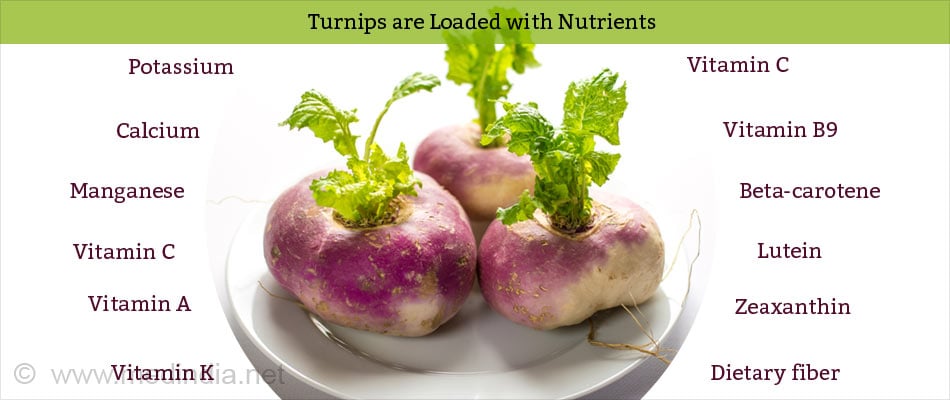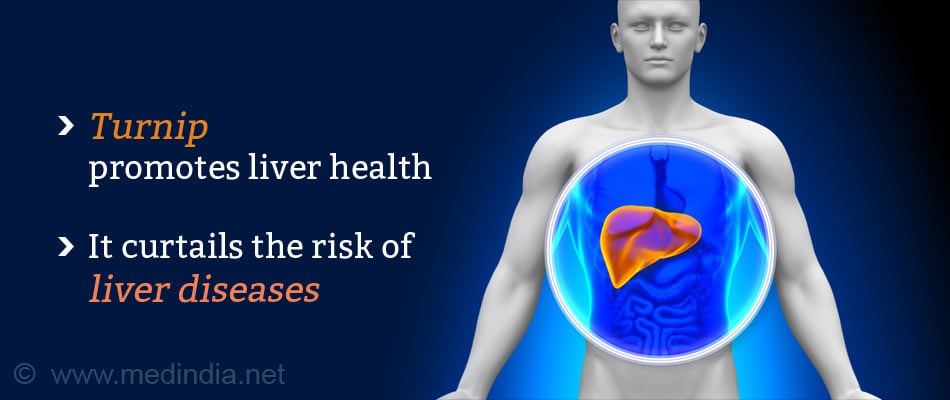- Vitamin C supplementation lowers serum low-density lipoprotein cholesterol and triglycerides: a meta-analysis of 13 randomized controlled trials - (https://www.ncbi.nlm.nih.gov/pmc/articles/pmc2682928/)
- A new phenanthrene derivative and two diarylheptanoids from the roots of Brassica rapa ssp. campestris inhibit the growth of cancer cell lines and LDL- oxidation. - (https://www.ncbi.nlm.nih.gov/pubmed/2343594)
- Journal of Medicinal Plants Research Vol. 5(31), pp. 6813-6821, 23 December, 2011
What is Turnip?
Turnip has been consumed by both man and animal since ancient times. Botanically, it belongs to "Brassicaceae" family. It is one of the oldest cultivated vegetables that has been consumed by humans. In India, turnip is popularly known as shalgam in Hindi, nookol in Tamil, knool khol in Telugu, navalkhol in Kannada and tharkaari kizhangu in Malayalam.
Turnips are round or swollen in shape and nature has gifted us different varieties of this vegetable. Each variety has a distinct flavor and color. Some common varieties of turnip include purple top strap leaf turnip, purple top white globe turnip, purple top milan turnip, orange jelly turnip, goose egg turnip, and seven top turnip.
In early times, turnips were more of a staple in the European kitchens but soon it gained popularity all around the globe. Today, this vegetable is valued for its nutrient-rich profile and versatility everywhere.
Turnips grow in a similar fashion as that of carrots. Turnip root or the swollen part grows under the ground during the first year whereas, its leaves form above the ground.
This amazing vegetable can be baked, fried, mashed, boiled or it can be simply used in salads and soups.
Health Benefits of Turnip
Powerhouse of Nutrients:
Turnip is a low-calorie vegetable, which is ideal for weight loss. They are a moderate source of protein, and an excellent source of dietary fiber.
Potassium, calcium, manganese, vitamin C and dietary fiber are accumulated in the root of the turnip whereas, its greens are loaded with vitamin A, vitamin K, vitamin C and vitamin B9, lutein, beta-carotene, and zeaxanthin.

Anti-Bacterial Action of Turnips:
Turnips as well as its leaves are very effective against most pathogenic micro-organisms that cause infections. It prevents the onset of fungal as well as bacterial infections.
Health-promoting compounds such as flavonoids and phenolic acids present in turnip kills the disease-causing microorganisms and prevents their growth and multiplication.
Thus, turnip consumption is a safe and reliable way to fight against bacterial infections.
Good Source of Antioxidants
Turnip is a natural source of antioxidants such as vitamin C, beta-carotene, and vitamin E. When turnip is consumed, these antioxidants scavenge free radicals present in the body and prevent diseases.
Such a high antioxidant potential of this vegetable is also attributed to the presence of phenolic compounds. Studies have revealed that yellow turnips have the highest amount of reductones that work by breaking the free radical chain and thus, it protects the cells against free radical damage.
Protects Against Stomach Infections:
Helicobacter pylori is a bacteria that grows in the stomach and it plays a causative role in the onset of peptic ulcers and gastritis.
Research has found that eating turnip regularly can help in the treatment of stomach ulcers. Turnip can help fight Helicobacter pylori via the following mechanisms:
- Phytochemicals present in turnip suppresses the colonization of Helicobacter pylori
- Turnips inhibit the action of inflammatory cells and thus lower the level of inflammation (Turnip boosts the immune response against bacteria and thus protects against the harmful effect of Helicobacter pylori

Helps in the Management of Diabetes:
Studies have observed that turnips contain various biological compounds that help in the management of blood sugar levels.
- Isorhamnetin, a compound present in turnip inhibits the enzyme that plays an important role in the complications of diabetes.
- Another compound named "kaempherol" present in turnip possesses hypoglycemic action. It further increases the absorption of glucose in the muscles. Thus, glucose is used as a source of energy rather than just being present in the blood.
- Quercetin is another compound present in turnip that reduces the blood sugar level and improves the sensitivity and action of insulin. It further protects the pancreatic beta-cells from damage and oxidative stress.
Supports Healthy Liver Function
Overuse of alcohol or drugs can damage the liver, alter its function and elevate the levels of liver enzymes. Consumption of turnip can protect the liver in the following ways:
- Turnip reduces liver injury and thus, helps in bringing back the level of liver enzymes within normal range
- Turnip contains vitamin C, flavonoids and polyphenols that help in the regeneration of liver cells
- It enhances the function as well as structure of the liver
- High antioxidant content of turnip protects the liver against the harmful action of free radicals, lowers the oxidative stress and hence, reduces the risk of liver diseases
- Phenolic compounds present in this vegetable neutralizes the reactive oxygen species that otherwise cause damage to the structure and function of the liver

Lowers Cholesterol and Triglyceride:
High level of cholesterol and triglycerides are risk factors for stroke and heart diseases. Turnip has been proven beneficial for individuals with altered lipid profile because:
- Turnip is a good source of vitamin C, which increases the concentration of "apolipoprotein A-1that enhances the degradation or removal of cholesterol from the body.
- It further increases the utilization of fat as a source of energy and less in stored in the body and converted to cholesterol.
- Quercetin, a natural antioxidant present in turnip has shown to lower low-density lipoprotein (LDL) or bad cholesterol and triglyceride levels. It further protects the heart and reduces the risk of atherosclerosis.
Protects Against Cancer:
Isothiocyanates present in turnip possesses anti-cancer activity against breast cancer. These compounds flush out cancer-causing toxins from the body. It stops the growth of tumor and prevents the multiplication and spread of cancer cells to other healthy organs of the body.
As turnip is a great source of antioxidants, it fights oxidative stress which is a major cause of cancer. Thus, adding turnip to your regular diet can reduce the risk of cancer.

Aids in Weight Loss:
About 100 grams of turnip contains 28 calories. Besides this, turnip is an amazing source of dietary fiber. Intake of fiber-rich foods provide satiety and hunger pangs are suppressed.
Other Benefits of Turnips:
- Drinking turnip juice can help in the treatment of kidney stones. It helps in dissolving the stone, if the stone is small in size.
- Studies have revealed that turnip strengthens the bones and keeps bone-related diseases and disorders at bay due to its high calcium and potassium content.
- It is used to treat sore throat, jaundice and hepatitis.
- Lutein, a carotenoid present in turnips is very important for vision. This carotenoid protects the eye tissue against damage and thus protects overall vision. Studies have observed that lutein-rich foods help in the prevention of cataracts.

Recipe Using Turnip:
Turnip Kebabs
Ingredients:
- Turnips- 500 grams
- Onions- 1/2 cup (chopped)
- Garlic- 3 cloves (chopped)
- Pepper powder- 1/2 teaspoon
- Green chilies- 3 (finely chopped)
- Bread- 3 slices
- Coriander leaves- handful
- Salt- as per taste
- Oil- 2 tablespoons
Method of Preparation:
- Peel the turnips and boil them in a pressure cooker
- Mash the turnips and remove all the excess water
- Add onion, garlic, chilies, coriander leaves, pepper powder, salt to the mashed turnip mixture
- Soak 3 slices of bread in water, remove excess water and add it to the above mixture
- Mix all the ingredients properly until the mixture becomes firm
- Divide the mixture into equal parts and give them the shape of kebabs
- Heat oil in a non-stick pan and cook/ roast the kebabs till they turn golden brown on both sides
- Serve hot with homemade chutney







